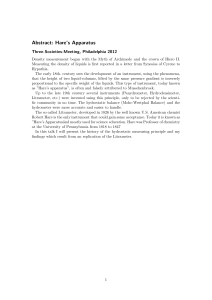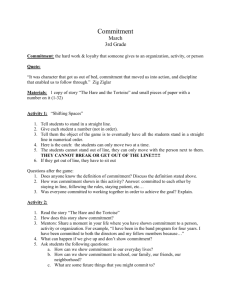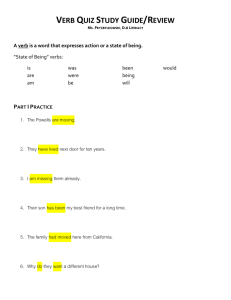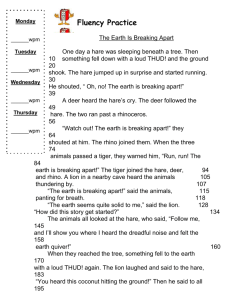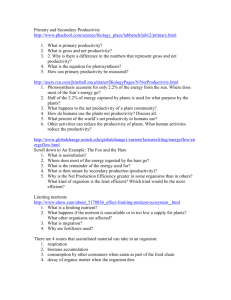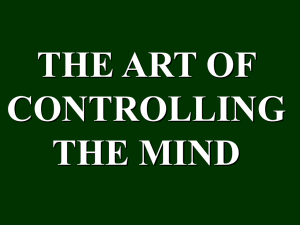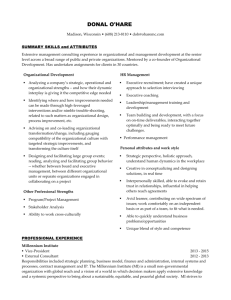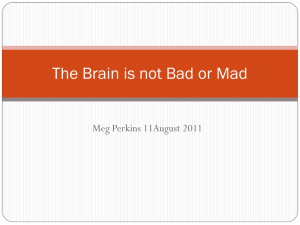David Hare
advertisement
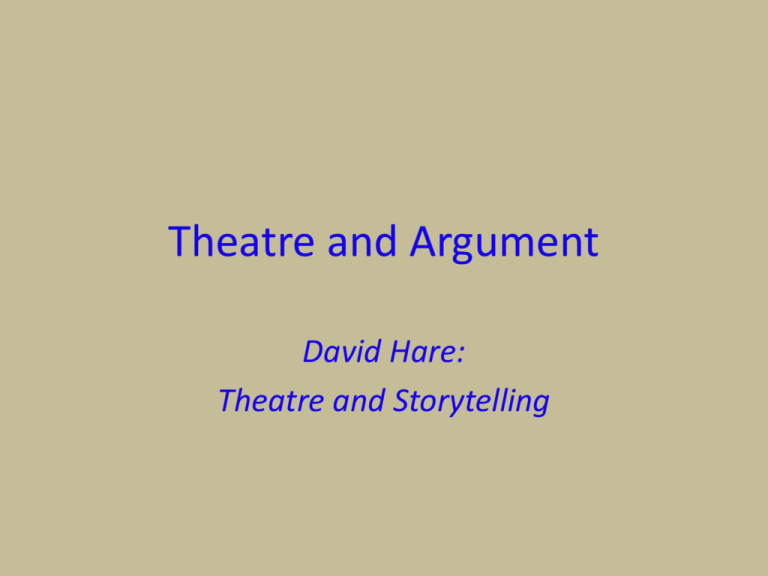
Theatre and Argument David Hare: Theatre and Storytelling BARKER vs. DAVID HARE • Barker wants to throw the audience (and performers) sense of experience into flux. • He refuses to cater to what is expected • He seeks to transform an experience - this is how he understands the term dramatic; a bewildered audience – dislocated • Leading to ‘possibilities’ as their expectations are ‘rinsed out of them”. 2 BARKER vs. DAVID HARE • In Barker’s theatre, the audience is relieved of the burden of being brought to the author’s point of view - who cares? - we ask the spectator to be imaginative. • And here , with this last quote Hare and Barker meet. • And yet their plays and approached appear to be very different in form and content. 3 DAVID HARE Why Fabulate? • Hare’s plays are both fact/ argument & art. • Hare might also ask what of the ‘collision’ between intellect and art – but unlike Barker, he does not see a division. The two live happily side by side. 4 DAVID HARE Why Fabulate? • an alternate title might be: in search of truth: what is the act of theatre? • Hare occasionally stops and asks : why am i doing what i am doing (playwriting / producing MORE stories ) and what is it am i doing? • [we] sit down to watch actors simulate situation which producers hope audience will recognise. • why does it matter whether we call it art or not. DAVID HARE Why Fabulate? • ..we rarely pause to ask whether the consumption of endless parallel narratives is necessary, and (hare asks again ) what it is exactly we are doing when we indulge in it to extraordinary excess. • Royal Academy member: “Picasso can’t paint a tree”. • ‘No’ said Picasso ‘He right. I can’t paint a tree. But i can paint the feeling you have when you look at a tree”. • Hare states: it is this inner sense – knowing what we know but able to give it voice and shape – this gift for expressing the inexpressible – offers the artists his claim of superiority to somebody who merely documents. DAVID HARE Why Fabulate? • The audience know they are watching a play. • By Picasso’s criteria: Hare did not paint the unfolding events in Iraq. He painted the anger – on both sides- that we feel when we look at the events. • Seeing this play made me realise how easy an assumption it is that what we see on television, presented to us as fact, is in any sense ‘true’. • hare is arguing that it is precisely because there are so many stories being told that audiences need to be refreshed. • why fabulate? “because it already exists. people are all already doing it – badly. half baked TV – half baked newspaper: The Sun ‘Opinion with balls”. DAVID HARE Why Fabulate? “And let me be clear, not only do i look to leave the theatre knowing more, but most especially i hope to know more about now. .. a lifetime of storytelling convinces me that nothing is harder in the arts than to be contemporary”. DAVID HARE metaphor & imagination • Stuff happens: I have no idea what happened between Bush and Rice : I invent. • Beckett does not know Vladimir and Estrogen • Rules of the game are the same • If you see a sculpture of wood you recognise it as art • You do not have to have actually made the wood • The artist carves the wood 9 BILLINGTON on HARE • Stuff Happens: A history play which happens to centre on very recent history. • Theme: Iraq, Bush administration, a pretext for invasion and internal opposition. • Form: mixture of verbatim dialogue with imaginative speculation. THEATRE & ARGUMENT • How can Hare’s approach to argument (and the form it takes in his plays) help us to understand a relationship between society and theatre 11 DAVID HARE OBEDIENCE, STRUGGLE & REVOLT • • • • David Hare’s Obedience, Struggle & Revolt seeks to answer: What is a political playwright? What is the relationship between art and politics? Does theatre have any direct affect on society? 12 HARE, IN HIS OWN WORDS • David Hare – at LRB book shop, talks about Obedience, Struggle and Revolt. • http://www.lrbshop.co.uk/news/11/DavidHare---Obedience-Struggle-and-Revolt.html DAVID HARE OBEDIENCE, STRUGGLE & REVOLT • The title comes from a Balzac quotation; the three paths in life available to the young: • Obedience, is dull, • revolt is impossible • struggle is hard. 14 DAVID HARE OBEDIENCE, STRUGGLE & REVOLT • “I love the Balzac quote because he is saying revolt is impossible. Those of us in 60s were all inflamed by the idea of revolution”. David Hare 15 DAVID HARE OBEDIENCE, STRUGGLE & REVOLT • Hare presents audiences with spectacles that might move them with cruel honesty about the world and thereby fight injustice. • Better outrage than complacency. • Better John Osborne than Noel Coward (Guardian) 16 DAVID HARE OBEDIENCE, STRUGGLE & REVOLT • Hare fears ‘dullness’. • He grew up in the 1950s, an era 'stuperfyingly uninteresting and conformist'. (Guardian) • Hare's commitment to forging social change, while fed by leftwing doctrine along the way, was clearly born of revulsion at the torpor of postwar Britain. Nothing is more dangerous in his eyes than the ease with which our society slips back to a default position of supine deference to the establishment. (Guardian). 17 DAVID HARE • Politics is root of struggle. • Opinion takes a side. This is political. Theatre/ Theory: there is no neutral. • If we agree that Hare is polemical, we might also agree that it is both his forte • “These essays aim to make you angry, in a good way - the same could be said of his plays”. (Guardian) DAVID HARE OBEDIENCE, STRUGGLE & REVOLT We could approach David Hare in the following context: • Hare believes politics can be a literary subject ...and we could also approach reading this book in the following context: • “I depend on metaphor”. ( LRB talk) • This is where the art comes into his political writing - no longer journalism 19 DAVID HARE from a defence of the new • ‘observing the audience taught me that whatever their aesthetic judgement on the plays, there was a wish to have a place where they could go to see the currency of present day life set before them and given some sort of shape. The thirst is there. I contend that if we fail to satisfy that thirst then we have no one but ourselves to blame. if theatre is drifting, then the likely reason is that not enough good writers are writing good enough plays’. • PUBLIC VS. PRIVATE • Exploring a public event through the personal experiences. • “Examine the political process that promoted the US and Britain to go to war”. HARE AND SOCIETY • His connection to society is that he writes plays about issues that he sees as important, relevant and interesting to society. • Why does he pack theatres? • He writes about events that are happening right now, in their society. HARE AND POPULAR THEATRE • Why might Hare is revered both here and in America? • Howard Barker: “Who”? WEB SOURCES • http://www.youtube.com/watch?v=FFXJ9yu5 hdc. David Hare on Stuff Happens on ‘Theater Talk’ • David Hare – at LRB book shop, talks about Obedience, Struggle and Revolt. http://www.lrbshop.co.uk/news/11/DavidHare---Obedience-Struggle-and-Revolt.html
